Lorina Stephens's Blog, page 52
May 29, 2013
Five Star review for 88 at LibraryThing
Over at LibraryThing our first review has come in for Michael R. Fletcher's 88.

I really liked this book. I was drawn into this edgy futuristic world via the heavy detail and action. Several of the characters became my literary companions as I read more and more pages until I felt like I had known them for months. When the book ended, I wished only for a few more chapters to keep it going ... sadly that never came. I cannot wait until the sequel. top marks to the author and his plots within plots. ( )
)
 |
| 
 flagspinardo | May 19, 2013 |
flagspinardo | May 19, 2013 |



I really liked this book. I was drawn into this edgy futuristic world via the heavy detail and action. Several of the characters became my literary companions as I read more and more pages until I felt like I had known them for months. When the book ended, I wished only for a few more chapters to keep it going ... sadly that never came. I cannot wait until the sequel. top marks to the author and his plots within plots. (
 )
) |
| 
 flagspinardo | May 19, 2013 |
flagspinardo | May 19, 2013 |


Published on May 29, 2013 03:00
May 24, 2013
K.L. Neidecker of The Blaagh reviews Fletcher's 88

K.L. Neidecker over at The Blaagh gives a stunning review of Michael R. Fletcher's 88.
Time for some SF goodness.
My day-job has me doing a lot of two things: Driving, and running away from dogs loosed on me after cutting someones cable off.
Good cardio, that second bit.
While driving, I love to listen to podcasts via my Android phone. I have no choice, as my area has only three types of radio stations: Classic rock (not bad, but just how many times can you hear the same ten songs), Country, or Country. Yes, County is listed twice for a reason.
I consume more podcasts in a week than most people do in a month. I hope they aren’t fattening.
Anyway, while enjoying an episode of the excellent “Get Published” podcast, which can be found at Irreverent Muse, I heard an interview with one Michael R Fletcher.
This interview revolved around his upcoming, debut novel “88″.
One thing he said really caught my attention; Some blogs and book review sites were turning their noses up at novels published by the smaller houses.
I hadn’t thought of that.
You think, “Hey, when this gets published, it’s published, right?”
Then you just have to get your masterpiece into the hungry hands of reviewers and bloggers, right?
Well, it seems some folks, obviously behind the times, still view a novel to only be worth a damn if published by one of the big houses.
That’s pretty damn snobbish.
I have been called a lot of things in my life, but a snob is not one of them.
And so I hit the Irreverent Muse site, clicked over to Michael R Fletcher’s page, and contacted him for a review copy of his novel.
Read on, dear reader, and let me tell you a (spoiler free) tale of a book called “88″.
Virtual worlds, crime cartels, robot fights and a hint-o-dystopia? Where do I sign up?
First and foremost, here is the blurb, hot from the Amazon entry for “88″.
The dream of Artificial Intelligence is dead and the human mind is now the ultimate processing machine. Demand is high, but few are willing to sacrifice their lives to become computers. Black-market crèches, struggling to meet the ever-increasing demand, deal in the harvested brains of stolen children. But there is a digital snake in that fractally modelled garden; some brains make better computers than others. 88, a brilliant autistic girl, has been genetically engineered and raised from birth to serve one purpose: become a human computer. Plagued by memories of a mother she never knew and a desire for freedom she barely understands, she sets herself against those who would be her masters. Unfortunately for 88, the Cuntrera-Caruana Mafia clan have other plans for her. Griffin Dickinson, a Special Investigator for the North American Trade Union, has been tasked with shutting down the black market crèches. Joined by Nadia, a state-sanctioned reporter and Abdul, the depressed ghost of a dead Marine inhabiting a combat chassis, Griffin is drawn deep into the shady underbelly of the brain trade. Every lead brings him one step closer to an age-old truth: corruption runs deep. An army of dead children, brainwashed for loyalty and housed in state of the art military chassis, stand between Griffin and the answers he seeks. But one in particular, Archaeidae, a 14-year old Mafia assassin obsessed with Miyamoto Musashi, Sun Tzu, and Machiavelli, is truly worthy of fear. Archaeidae is the period at the end of a death sentence.
Should I just end this post here? I mean, just read that description. My blood-sugar spikes just eyeing all those sweet bits of SFgoodness.
Well, let’s see if the novel is as good as the blurb.
If there is one word that could describe this book, it’s “tight”.
The prose is sharp, descriptive where needed, terse and accurate during action (of which there is plenty), full of life during dialog.
No doubt due to both the talent of Michael R Fletcher and the hard work put in by folks at Five Rivers Chapmanry, the publisher of “88″, this novel comes off as a fully professional piece of writing through and through. No half-assed writing here, no indication this is a debut novel anywhere in sight.
88, ignoring the relentless emptiness in her belly, studied the cracks in the walls and floor. The cracks were a system, a coded message from the universe, pregnant with information and sly with subtle hints. She leaned forward, face close to the floor as she stared at the microscopic clefts and crevices in the dirty stone. They spoke to her, revealing all they could of the reality beyond.
Not once did I feel this was anything less than a full-fledged novel written by an author who knows his stuff and cared for by a publisher that gives a damn.
Now let’s talk concepts.
There is a whole lot going on in “88″. More than once, I found myself in awe of the concepts introduced in this novel.
As cyberpunk did in the dawn of home computing, this novel takes technology found around us today and postulates what may be in the near future. The world is networked, countries are basically outmoded ideas replaced by trade unions similar to what the EU is now. Conflicts tend to be internal rebellions due to food shortages, rather than wars between countries.
A.I. is a waste of time due to technology that allows the entire personalities and thought processes of individuals to be ‘scanned’ and used as a computer. Want to live forever? Just sign up with your government and let them scan you. The cost? Oh, you just have to work for them for a while. A few decades or so. No biggy. Oh, and scans don’t have the same rights as humans. Oh, and you have to work off the cost of the procedure and the gear you are riding around in.
What stresses would fall upon once living people as they found themselves more like a CPU than a human? What would combat be like if human brains directly controlled machines of war? How would the world change if you could live forever, and maybe regret your choice to do so?
Abdul, though he was aware of the pressure of her fingers and able to measure the temperature of her skin, couldn’t actually feel the touch. Just moments ago he was dreaming of human contact and here it was, another moment stolen. Abdul added it to the list of hurts.
Concepts are worth little without plot to glue them together, so let’s talk story now.
The plot is thick and interesting. I found myself impressed with the deft handling of all the plot-lines in “88″.
We follow the small autistic girl, known only by the number 88, as she is used by unscrupulous individuals in the illegal trade of scanned minds. Without spoiling anything, let me just say these individuals may have gotten a little more than they bargained for with this potent mind.
We ride along with Griffin Dickinson, an agent tasked with shutting down these illegal mind-thefts, as he is joined by a journalist and an (awesome) war machine piloted by a scanned Marine. This is a complex set of events with very likable characters, and raises some real questions about the ethics of this scanning technology.
We watch as a powerful individual has himself scanned and moves forward with an insane plan to reinvent the human race. This is another interesting thread in the plot, and what this individual does effects all the other characters in interesting ways.
We run behind Archaeidae, a powerful assassin war-machine piloted by a child’s scanned mind, as he tries to please his masters, slashing his way through foes.
Yet, with all of this going one, with multiple characters doing diverse actions, sometimes half a world away from each other, I found the story to be eminently understandable.
There were times when, due to time constraints, I was unable to read any of the novel for a week. But when I picked up my Kindle again, I was able to slide back into the story in only a moment.
That, dear reader, is the sign of a well told tale.
“88″ came out of nowhere for me. I took a chance and contacted an author about a debut novel that sounded interesting. And I am glad I did.
Michael R Fletcher weaves a brilliant tapestry in “88″, one with overlapping threads of dystopia, high-tech concepts, human rights, and action.
The plot is punchy, and action full of motion and detail, and the characters are unique and well fleshed out. Get it, read it, love it!
Sounds great! Where can I find this book?
Amazon (US)
Amazon (UK)
Amazon (CA)
Kobo
B&N Nook
Powell’s Books
Indigo
More info about the author can be found on his site.

Published on May 24, 2013 03:00
May 21, 2013
Publishing in the New Millennium
Any of you who know me, also know I've bleated on for some years regarding the profound changes occurring in publishing, how it is the traditional method of publishing and bringing books to market is obsolete and simply not viable in today's global, technology-driven economy.
Over the past five years we've structured Five Rivers Publishing so that:
We do not rely on sales from bricks and mortar stores
As much as a decade ago I realized there was going to be a dynamic shift in how consumers purchased many of their products, sliding from in-store experiences to online. Why this shift? It's just easier, especially in light of increased demands on leisure time. The mall experience declined as shoppers fell out of fascination with the day or evening complete experience that often combined shopping with socialization and dining.
That gave rise to the Big Box stores and malls, which required lots of short driving once you arrived at the mega-destination. And while retail developers attempted to maximize the mall experience and marry it to the North American penchant to 'biggie' everything, the Big Box experience very quickly lost momentum. Retailers soon realized they could capitalize on the growing trend to live life through the Internet, offer free shipping, which was offset by diminished need for expensive retail footprint. One trend fed the other, which hugely affected the book-buying experience.
For the hopeless bibliophile, with only so much time and money to spend, it became easier to spend leisure hours clicking keys to procure your latest literary fix, than dressing, driving, browsing, only to find the book you wanted was no available in that store, going through the disappointment and frustration of having to order said book, leave, return a few weeks later to pick up the coveted book, and finally return home, shaking and suffering withdrawal, fix in hand, or bag as it were.
I knew I was making that transition in my own personal purchasing. It only made sense the rest of the Western World would be doing so as well.
And then there was a logical analysis of retail floor space in a bookstore. Just how many titles, reasonably, could a store stock? And how many titles were being published each year? Marry that to the fact print on demand was allowing small publishers and independent authors to produce books economically, and competition for that shelf space became ferocious. And so it was usually only the major houses had their titles stocked on shelves. Small and micro publishers could take lessons puckering up to whistle the blues, because their books certainly weren't going to ascend the heights of the shelves.
Then came what many in the industry called publishingeddon. Put another way, lots of chickens running around with umbrellas, screeching doom. Well, it wasn't doom. It was simply a paradigm shift in marketing and consumerism.

Print on demand the only logic response

Very early it became clear to me that if Five Rivers was going to be sustainable and successful, we would have to embrace some pretty (then) radical publishing methods that not only allowed us to achieve a healthy bottom line, but respect the environment which as any sane business person knows also affects your longevity and bottom line. It just didn't make any sense to print thousands of books and warehouse them in preparation of future sales. Knowing sales from a small press were going to be much smaller than sales from a large house, we needed a modern and viable production method. Print on demand met that perfectly.
Although there's a huge difference in print on demand depending which firm with which you choose to contract, we are able to produce our books for almost the same price as offset by using Lightning Source. That allows us to keep a minimum of stock in-house for small orders we receive, while doing fulfillment directly through our printer.
Which brings me to:
Distribution
A few days ago I read an interesting post by author, publisher and distributor, Kristine Kathryn Rusch, in which she laments the closure of their distribution business. I couldn't help but feel Rusch had somehow missed what was happening in publishing, and could have circumvented yet another business disappointment.
As recently as 2005 I realized traditional distribution channels were going to break down and disappear, just as were similar channels regarding agents. With players like Lightning Source married to enormous distribution giant Ingram, and Amazon with all it's clout and business leverage, and the decline of bricks and mortar bookstores, it seemed only logical the long tail of publishing -- in this case the distributors -- were going to take a hit. And they are. As a publisher, why would you give up another 5% to 10% of your profit to have a firm distribute titles you can easily distribute yourself through new, dynamic channels at no extra cost?
Certainly Kelly Gallagher of Ingram and Allan Lau of Wattpad both agree traditional distribution partners are now on the endangered species list.
Pay attention to your product
So, in this new publishing landscape, where anyone with an idea and a will can release a book, whether print or digital, what's to make your work stand out from the literally millions of books being published? Quality.
In way we've created a new version of where publishing began prior to the 20th century. Individual authors or small publishers, paying attention to a niche market, spending time to make sure the books they produce are well-written, well-edited, and marketing to the target demographic. All of that is possible now because of the publishing technologies we have available for both print and digital books, because of distribution services offered by the printers who have adapted to the new publishing world, and because of social networking tools that allow you to inform potential readers of the titles you're producing.
Given 20% of publishers produce under $1,000,000.00 in sales in North America, that's a significant portion of the overall publishing landscape. And it's in that 20% you're going to find some of the most innovative, interesting books being produced in this new millennium of publishing.

Over the past five years we've structured Five Rivers Publishing so that:
We do not rely on sales from bricks and mortar stores
As much as a decade ago I realized there was going to be a dynamic shift in how consumers purchased many of their products, sliding from in-store experiences to online. Why this shift? It's just easier, especially in light of increased demands on leisure time. The mall experience declined as shoppers fell out of fascination with the day or evening complete experience that often combined shopping with socialization and dining.
That gave rise to the Big Box stores and malls, which required lots of short driving once you arrived at the mega-destination. And while retail developers attempted to maximize the mall experience and marry it to the North American penchant to 'biggie' everything, the Big Box experience very quickly lost momentum. Retailers soon realized they could capitalize on the growing trend to live life through the Internet, offer free shipping, which was offset by diminished need for expensive retail footprint. One trend fed the other, which hugely affected the book-buying experience.
For the hopeless bibliophile, with only so much time and money to spend, it became easier to spend leisure hours clicking keys to procure your latest literary fix, than dressing, driving, browsing, only to find the book you wanted was no available in that store, going through the disappointment and frustration of having to order said book, leave, return a few weeks later to pick up the coveted book, and finally return home, shaking and suffering withdrawal, fix in hand, or bag as it were.
I knew I was making that transition in my own personal purchasing. It only made sense the rest of the Western World would be doing so as well.
And then there was a logical analysis of retail floor space in a bookstore. Just how many titles, reasonably, could a store stock? And how many titles were being published each year? Marry that to the fact print on demand was allowing small publishers and independent authors to produce books economically, and competition for that shelf space became ferocious. And so it was usually only the major houses had their titles stocked on shelves. Small and micro publishers could take lessons puckering up to whistle the blues, because their books certainly weren't going to ascend the heights of the shelves.
Then came what many in the industry called publishingeddon. Put another way, lots of chickens running around with umbrellas, screeching doom. Well, it wasn't doom. It was simply a paradigm shift in marketing and consumerism.

Print on demand the only logic response

Very early it became clear to me that if Five Rivers was going to be sustainable and successful, we would have to embrace some pretty (then) radical publishing methods that not only allowed us to achieve a healthy bottom line, but respect the environment which as any sane business person knows also affects your longevity and bottom line. It just didn't make any sense to print thousands of books and warehouse them in preparation of future sales. Knowing sales from a small press were going to be much smaller than sales from a large house, we needed a modern and viable production method. Print on demand met that perfectly.
Although there's a huge difference in print on demand depending which firm with which you choose to contract, we are able to produce our books for almost the same price as offset by using Lightning Source. That allows us to keep a minimum of stock in-house for small orders we receive, while doing fulfillment directly through our printer.
Which brings me to:
Distribution
A few days ago I read an interesting post by author, publisher and distributor, Kristine Kathryn Rusch, in which she laments the closure of their distribution business. I couldn't help but feel Rusch had somehow missed what was happening in publishing, and could have circumvented yet another business disappointment.
As recently as 2005 I realized traditional distribution channels were going to break down and disappear, just as were similar channels regarding agents. With players like Lightning Source married to enormous distribution giant Ingram, and Amazon with all it's clout and business leverage, and the decline of bricks and mortar bookstores, it seemed only logical the long tail of publishing -- in this case the distributors -- were going to take a hit. And they are. As a publisher, why would you give up another 5% to 10% of your profit to have a firm distribute titles you can easily distribute yourself through new, dynamic channels at no extra cost?
Certainly Kelly Gallagher of Ingram and Allan Lau of Wattpad both agree traditional distribution partners are now on the endangered species list.
Pay attention to your product
So, in this new publishing landscape, where anyone with an idea and a will can release a book, whether print or digital, what's to make your work stand out from the literally millions of books being published? Quality.
In way we've created a new version of where publishing began prior to the 20th century. Individual authors or small publishers, paying attention to a niche market, spending time to make sure the books they produce are well-written, well-edited, and marketing to the target demographic. All of that is possible now because of the publishing technologies we have available for both print and digital books, because of distribution services offered by the printers who have adapted to the new publishing world, and because of social networking tools that allow you to inform potential readers of the titles you're producing.
Given 20% of publishers produce under $1,000,000.00 in sales in North America, that's a significant portion of the overall publishing landscape. And it's in that 20% you're going to find some of the most innovative, interesting books being produced in this new millennium of publishing.

Published on May 21, 2013 12:21
May 13, 2013
Glowing review from Britain's SFCrowsnest for 88
A glowing review showed up today on Britain's SF Crowsnest for Michael R. Fletcher's debut SF novel, 88.
Rod MacDonald writes:

Rod MacDonald writes:
This book, ‘88’, seems to have it all as far as action is concerned. Coming from Canada, we have a novel by Michael R Fletcher, which on first inspection appears to be a little like Vin Diesel’s ‘Babylon A.D.’ with also bits of ‘Resident Evil’ chucked in, such is its flavour, although on closer inspection, it does have its own distinct and unique identity.
An old argument is awakened, that being the conflict between nurture and nature. Are we enslaved and governed by our genetic code or do we have free will to steer our own path through life? Lysenko went for the latter with disastrous results for Russia and Pavlov and Skinner with their dogs and pigeons apparently went for the genes but probably it’s a mix up between the two and we will never really come to an answer. This is a question that arises in ‘88’. Exactly who or what is 88? It turns out 88 is a young woman with a brain that has been programmed to be a computer.
In this futuristic world of 2034 that Fletcher presents, human brains have proved to be the most useful computers, far going beyond their machine counterparts. Though we might not think so, properly managed brains are very good at computing, especially when the subject is autistic. 88 has been destined since birth to be a computer but she doesn’t like it and, switching to break free from her genetic constraints, she tries to make a run for it with memories of an uncertain past haunting her every movement. Rather like the Robocop’s dreams she tries to come to terms with her past.
In comes a guy called Griffin Dickinson. This special investigator with fairly good abilities has been set the task of crushing the black market in human brains. In opposition is a Mafia that makes money out of the production and sale of the brains and they don’t like 88 setting out for a life of her own. Dickinson, along with some weird bodies, including an electronic ghost, tries to make a difference in this corrupt and dangerous world. Against them is an army of what can only be described as children zombies in souped-up suits, with no minds of their own except to serve and be loyal to the Mafia. One in particular, a guy called Archaeidae, is particularly nasty. You wouldn’t want to meet him! Dickinson has got to do battle with Mr. Nasty in order to look after 88 and smash the illegal trade in human brains.
Fletcher’s descriptions are particularly good, taking time to immerse the reader in the world he has created and though there is plenty of action on offer, that’s not all we get. The characters are not stereotypes but come through as real people. They are three-dimensional! I’m not really sure if another 20 years or so will see such changes to society, changes which would involve the radical electronic transformations that he suggests but the author has maybe got an inkling as to future developments that will plague us in distant years.
This is an interesting book and one worth reading. It’s probably one best expressed in another form, movies perhaps, but in the meantime enjoy it as it is. The sequel should be good.
Rod MacDonald
(pub: Five Rivers Publishing. 400 page enlarged paperback. Price: $30.99 (US). ISBN: 978-1-92740-023-4. Ebook: Price: $ 9.99 (US). ISBN: 978-1-92740-024-1)
check out website: www. fiveriverspublishing.com

Published on May 13, 2013 12:20
May 10, 2013
Nate Hendley to appear at Barrie Public Library

Nate Hendley
Five Rivers author, Nate Hendley, will appear Thursday, May 16, 7:00 to 8:00 p.m. at the Barrie Public Library, downtown in the Angus Room. He will be discussing his book, Steven Truscott: Decades of Injustice, which chronicles the tragic, and in the end triumphant, story of the wrongful conviction of a small-town Ontario 14 year old boy.
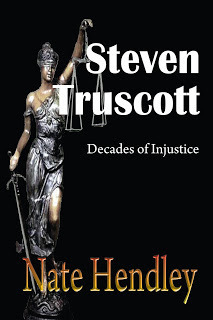
Format
Print $14.99 CAD
eBook $4.99 CAD

Hendley's book will be on sale at the end of the event, and he will be signing copies.
View Larger Map

Published on May 10, 2013 03:00
May 8, 2013
Susan Forest new Secretary for Science Fiction Writers of America

It would appear Five Rivers' author, Susan Forest, is staging a Canadian invasion of the Science Fiction Writers of America (SFWA). Last week she announced she had been elected Secretary, and will be taking over from outgoing Secretary, Ann Leckie.

Susan Forest reading at the World Fantasy Convention 2012
SFWA is a professional organization for authors of science fiction, fantasy and related genres. Esteemed past and present members include Isaac Asimov, Anne McCaffrey, Ray Bradbury, and Andre Norton.
Later this month Forest flies to San Jose, California to get up to speed with the board and work with Ann Leckie who will walk Forest through her new portfolio!
Forest is the author of the speculative fiction collection, Immunity to Strange Tales, available in print and eBook directly from Five Rivers, and online retailers globally.
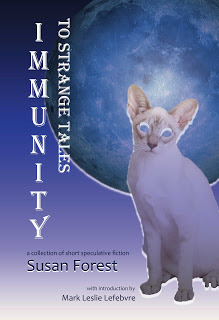
Format
Print $17.99 CAD
eBook $4.99 CAD


Published on May 08, 2013 03:00
May 6, 2013
Duo Book Launch for Type and 88

Join authors Michael R. Fletcher and Alicia Hendley, along with some of Five Rivers Publishing's crew for the duo-launch of 88, by Michael R. Fletcher, and Type, by Alicia Hendley. Fun, food, beverages, readings, signings, and yes -- even purchasing your very own copy of either or both of these fabulous novels.
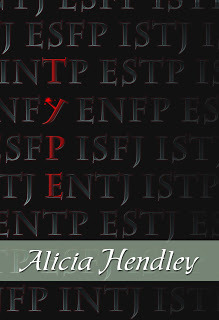
The event is being hosted by the good folks at Q Space, 382 College Street, Toronto, Ontario, June 22, 2013, 2:00 p.m. to 4:00 p.m. It's an amazing bistro/gallery/bookshop very much in the tradition of some of the finest coffee houses of the 17th and 18th centuries where discussion of art, literature and philosophy were the bill of fare.
View Larger Map
Nate Hendley, one of Five Rivers' prolific authors, will be the Master of Ceremonies for the event, and will be signing copies of his own books as well.

Should be a memorable afternoon. We hope you will be able to join us.

Published on May 06, 2013 03:00
May 3, 2013
Sharing launch of 'Shakespeare for Readers' Theatre', by John Poulsen
Thought we'd share a photo gallery from the launch party of John Poulsen's Shakespeare for Readers' Theatre: Hamlet, Romeo & Juliet, and Midsummer Night's Dream, which took place at the Round St. Cafe in Lethbridge, Alberta.

early guest arrive at Round St. Cafe

John Poulsen (far right) coaching the evening's readers

kibitzing with readers
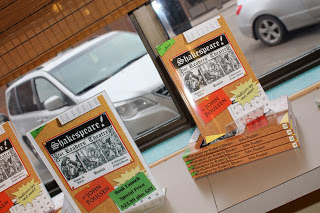
the books on display

John Poulsen (seat left), Dr. Robert Runte (standing left)

the readers rehearsing

John Poulsen catching sustenance during the event

John Poulsen signing his book

John Poulsen greeting guests
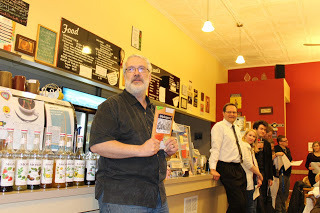
Dr. Robert Runte introducing John Poulsen
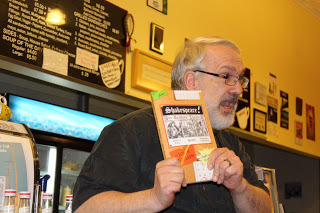
"You really should buy this book!"

The performance

Romeo & Juliet kiss

The proud director

Signing copies

How do I tie this thing?


early guest arrive at Round St. Cafe

John Poulsen (far right) coaching the evening's readers

kibitzing with readers

the books on display

John Poulsen (seat left), Dr. Robert Runte (standing left)

the readers rehearsing

John Poulsen catching sustenance during the event

John Poulsen signing his book

John Poulsen greeting guests

Dr. Robert Runte introducing John Poulsen

"You really should buy this book!"

The performance

Romeo & Juliet kiss

The proud director

Signing copies

How do I tie this thing?

Published on May 03, 2013 03:00
May 1, 2013
Congratulations to Alicia Hendley
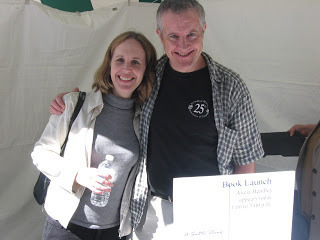
Alicia Hendley with brother and author Nate Hendley
at 2010 Toronto Word on the Street
Huge congratulations to Five Rivers' author, Alicia Hendley, for being short-listed in this year's Canadian International Film Festival's Write Brothers Screenplay Competition.
Hendley's screenplay adaptation of her newly released YA SF novel, Type, was one of 15 screenplays to be named in this year's competition.

The novel is now on sale through all major online booksellers, as well as directly from Five Rivers, in both print and digital formats.
2013 Write Brothers Screenplay Competition Winners
Grand Prize Winners
1st Place: "Disabled Parking" written by Alon Bar
2nd Place: "Twin Graves" written by Paul Ellington
3rd Place: "Crazier Than You" written by Amy Jo Johnson
Official Finalists
"Harley" written by Jamie Roberts
"Goodbye Komarom" written by Sheldon Schiffer & Dr. Amir Kovács
"Charlie Horse" written by Lynn Marie Ross
"Destiny's Ride" written by Debbie McGregor
"Clean Up Aisle 5" written by Michael Zamanis
"Steens Folly" written by Jeffrey Gold
"Skin" written by Alberto Diamante
"Marriagehood" written by John Harris
"Respect the Order" written by Dwight Stephen
"A Mother's Love" written by Camille Mitchell
"Loveband" written by Nicola Pedrozzi
"Type" written by Alicia Hendley

Published on May 01, 2013 03:00
April 29, 2013
Her Serene Omnipotence Calasandra Answers Our Questions
Her Most Serene Omnipotence Calasandra, Empress of Everything, condescended to answer the questions posed by the editors of the collection, A Method to the Madness: A Guide to the Super Evil.
[image error]
Rumoured to be the nebula in which Her Serene Omnipotence resides
We think you're going to find Her broadcast deliciously dastardly in only the most refined and distinguished of taste.
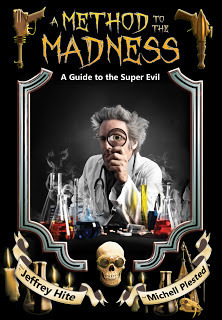
Read what Her Serene Omnipotence Calasandra
has to say in her tell-all article

[image error]
Rumoured to be the nebula in which Her Serene Omnipotence resides
We think you're going to find Her broadcast deliciously dastardly in only the most refined and distinguished of taste.

Read what Her Serene Omnipotence Calasandra
has to say in her tell-all article

Published on April 29, 2013 03:00




